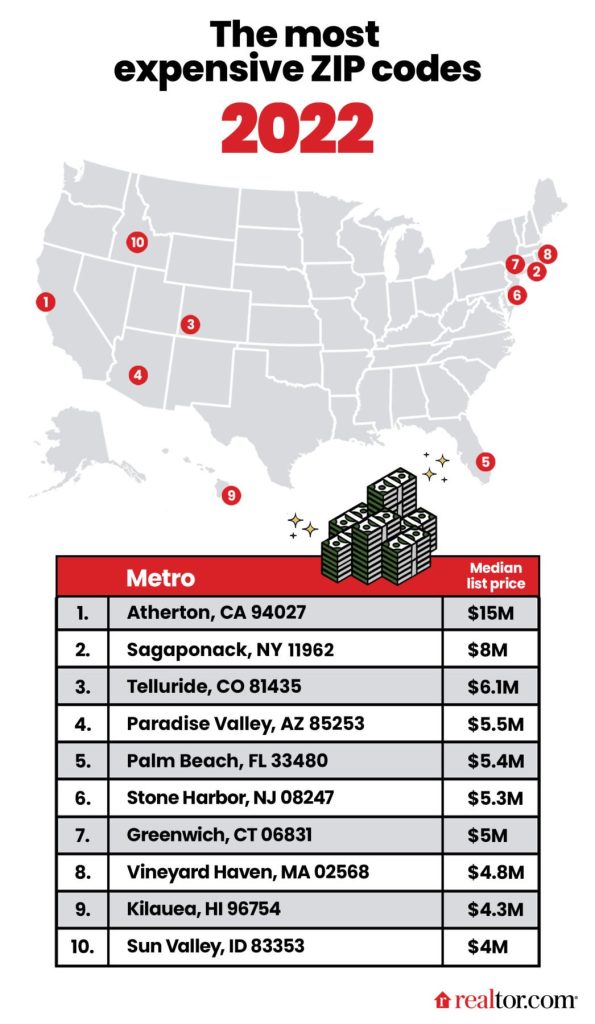Famous zip codes are more than just five-digit identifiers for mail delivery. They are cultural symbols, status markers, and historical references that evoke images of wealth, glamour, innovation, or even notoriety. These codes have transcended their utilitarian purpose and become part of our collective consciousness, representing certain lifestyles, neighborhoods, and aspirations.
Let’s delve into the fascinating world of famous zip codes, exploring the stories behind their rise to fame, the factors that contribute to their desirability, and the impact they have on real estate, tourism, and popular culture.

The Allure of Famous Zip Codes: More Than Meets the Eye
The allure of famous zip codes stems from a combination of factors:
Exclusivity and Prestige
Some zip codes are associated with exclusive neighborhoods, high-end real estate, and affluent lifestyles. These codes become synonymous with wealth, prestige, and social status.
Cultural Significance
Certain zip codes have been immortalized in popular culture through movies, television shows, and music. They become cultural landmarks, representing specific lifestyles, attitudes, or eras.
Historical Value
Zip codes associated with historical events or locations can also gain notoriety. They serve as reminders of significant moments in history and contribute to a sense of place and identity.
Unique Characteristics
Some zip codes stand out due to their unique numerical patterns, historical significance, or association with specific industries or communities. These codes often become conversation starters and contribute to a sense of local pride.
Top Famous Zip Codes in the United States
Let’s take a closer look at some of the most famous zip codes in the United States:
90210: Beverly Hills, California
Few zip codes are as iconic as 90210, synonymous with wealth, glamour, and the Hollywood lifestyle. This zip code, belonging to the city of Beverly Hills, California, is home to celebrities, luxury mansions, designer boutiques, and world-renowned restaurants. Its fame was further cemented by the popular television series “Beverly Hills, 90210,” which aired in the 1990s.
10021: Upper East Side, New York City
The 10021 zip code represents the Upper East Side of Manhattan, a neighborhood known for its affluence, cultural institutions, and architectural grandeur. This area is home to Museum Mile, a stretch of Fifth Avenue that houses several world-class museums, as well as luxury apartment buildings, high-end shops, and renowned restaurants.
94027: Atherton, California
Located in the heart of Silicon Valley, the 94027 zip code is home to Atherton, one of the wealthiest communities in the United States. This enclave is known for its sprawling estates, manicured lawns, and high concentration of tech industry leaders and venture capitalists.
02199: Back Bay, Boston
The 02199 zip code encompasses Back Bay, a historic neighborhood in Boston known for its Victorian brownstones, elegant shops, and upscale restaurants. The area is also home to the Prudential Center, a complex of shops, offices, and residences that offers stunning views of the city skyline.
10013: Tribeca, New York City
The 10013 zip code is associated with Tribeca, a trendy neighborhood in Lower Manhattan that has transformed from an industrial area to a hub for artists, celebrities, and young professionals. Its cobblestone streets, converted warehouses, and upscale boutiques create a unique atmosphere that blends historical charm with modern flair.
The Impact of Famous Zip Codes on Real Estate and Tourism
Famous zip codes have a significant impact on real estate values and tourism. Homes and properties located in these coveted areas often command premium prices, reflecting the desirability of the neighborhood and the associated lifestyle. The allure of these zip codes also attracts tourists from around the world, eager to experience the glamour, culture, and history they represent.
Real Estate Investment: A Status Symbol
For many, owning property in a famous zip code is more than just a financial investment; it’s a status symbol. The prestige associated with these codes can enhance one’s social standing and provide access to exclusive networks and opportunities.
Tourism and Economic Growth
Famous zip codes often become tourist destinations, attracting visitors eager to explore the landmarks, shops, and restaurants that make them famous. This influx of tourism can boost local economies, create jobs, and drive development.
Cultural Influence and Branding
Famous zip codes can also influence popular culture and branding. The 90210 zip code, for example, became a cultural phenomenon thanks to the success of the television show of the same name. Businesses and organizations often use famous zip codes in their marketing and branding efforts to evoke a sense of exclusivity, prestige, or cultural relevance.
The Future of Famous Zip Codes
As society and technology continue to evolve, the concept of famous zip codes may undergo transformations.
Shifting Demographics and Preferences
Changing demographics and shifting preferences may alter the perceived desirability of certain zip codes. As younger generations prioritize different values and lifestyles, new “famous” zip codes may emerge, reflecting changing trends and aspirations.
The Rise of Digital Communities
The increasing prominence of digital communities and online interactions may challenge the traditional concept of zip codes as geographic markers of identity. People may increasingly identify with online communities and virtual neighborhoods, blurring the lines between physical and digital spaces.
Technological Advancements
Advancements in technology, such as digital addressing systems like what3words, may offer alternative ways to identify locations, potentially reducing the reliance on traditional zip codes.
Conclusion: The Enduring Allure of Famous Zip Codes
While the future of famous zip codes may be uncertain, their enduring appeal is undeniable. These codes have transcended their utilitarian function as postal identifiers and become cultural symbols, status markers, and historical references. They represent our aspirations, our values, and our desire to belong to a community.
Whether it’s the glamour of 90210, the affluence of 10021, or the technological innovation of 94027, famous zip codes continue to capture our imaginations and shape our perceptions of place and identity. As we navigate an ever-changing world, these codes will continue to evolve, reflecting the dynamic nature of our society and the enduring human desire for connection and belonging.
Read Also: The Curious Case of the 88888 ZIP Code: Fact or Fantasy